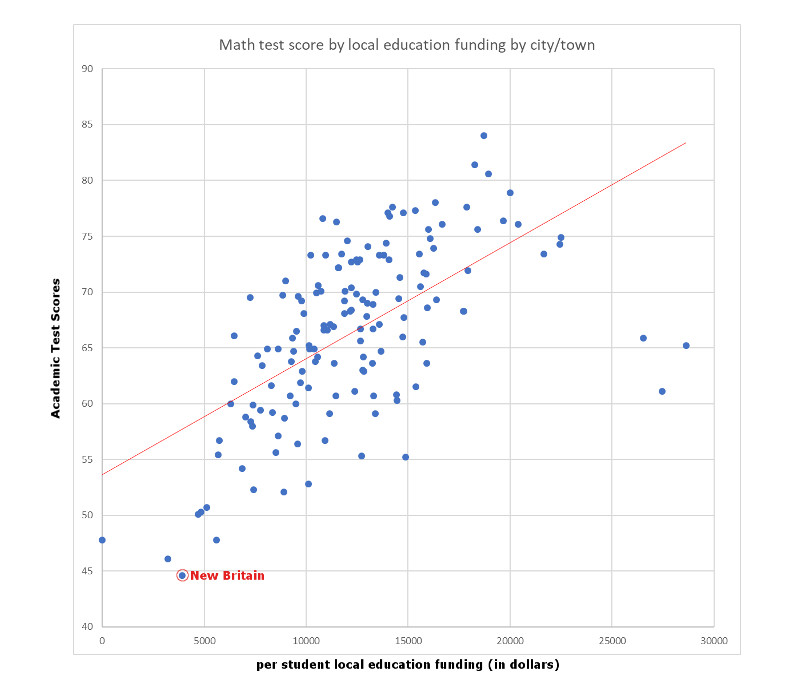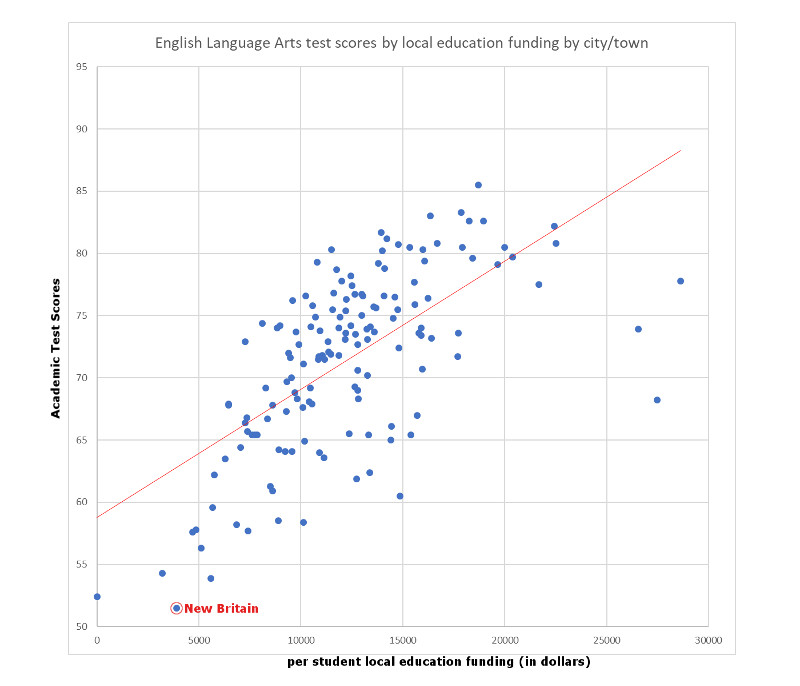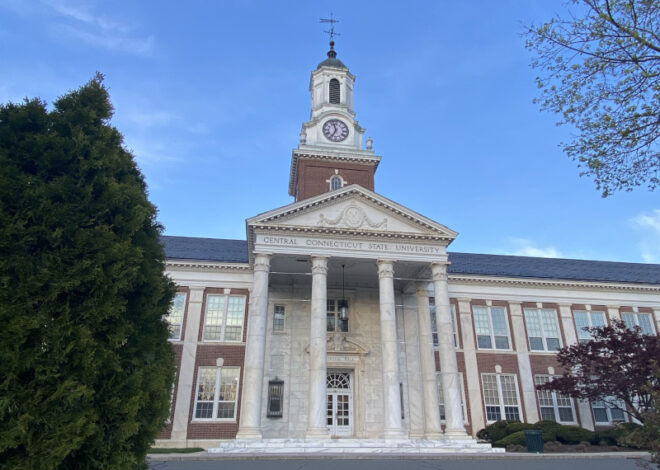The City Council’s Republican majority voted down Council Democrats’ proposal to increase the city funding for New Britain’s schools, and Council Republics went on to approve Republican Mayor Erin Stewart’s budget that freezes local funding for New Britain schools yet again.

Stewart’s three Democratic Mayoral opponents have all chided Stewart on her low support for the education of New Britain’s schoolchildren, with Democratic Mayoral candidate Veronica T. DeLandro even having urged people online to speak at the Council meeting Thursday evening to oppose the budget.
Democratic Mayoral candidate Alicia Hernandez Strong spoke at the Council’s public participation session, urging the Council to reallocate funds from the Police to the city schools and social services. Multiple other people also spoke to the Council oppose the budget and to allocate more for education.
At least one person spoke in support of the budget, saying the Council Democrats had enough time to present an alterative budget, urging the Council to support Stewart’s plan.
However, Ald. Aram Ayalon (D-3) addressed the people who spoke to the Council, saying that the Council’s Democrats did have a proposal to alter Stewart’s budget plan that would address many of the concerns expressed by members of public.
The Democrats reportedly released a budget proposal in recent days, but Council Democrats do not appear to have provided information on their proposal to the New Britain Progressive.
The Ald. Francisco Santiago (D-5), the Council Democrats’ leader, said that the Democrats’ budget plan would add $1,743,323 in the city budget to operating funding the city’s schools, add $44,000 for the Public Library and add $15,000 Youth Museum and to $50,000 to the fixing of sidewalks.
To support these changes, the Democrats say their proposal would move $500,000 planned for a controversial school “savings” account to the actual school budget, with additional money for the school budget made available by transferring $1,908,714 for a planned Aquinas project from the city budget to federal funds the city is set to receive. The Democrats say their proposal would also remove school resources officers from schools, cut the budget allocated for the Main Street USA festival from $120,000 to $75,000 and remove $45,000 for the city to hire a lobbyist.
Ayalon noted that the presence of police officers in the schools result in a disproportionate number of students of color and students with disabilities ending up with court appearances, increasing the schools to prison pipeline.
The Democrats apparently say their proposal would retain nearly all of Stewart’s proposed reduction in the property taxes, but would push more of that reduction into lowering of motor vehicle taxes.
The Democrats proposal was voted down by an apparent party line vote in the Republican majority Council.
In the end, Stewart’s budget was approved by a 9 to 4 vote.
Impact of Low City Schools Funding on Low School Test Scores
Stewart has come under intense criticism in New Britain for comments she made in her annual “state of the city” address this year, in which she doubled-down on her underfunding of the city’s schools. Stewart bluntly said that her longstanding policy of low-funding to New Britain’s schools would continue in the city budget for the upcoming year, saying, “what I will not do is blindly throw additional tax dollars into a massive bureaucracy that is failing our students.”
City leaders strongly criticized Stewart for those comments, and for her low funding for New Britain schools, in general.
Stewart essentially admitted, in her state of the city comments, that she has flat-funded the city’s schools, saying, “Every year, the Consolidated School District of New Britain receives about $126 million of taxpayer money, and today, it is dead last, when every metric within the state of Connecticut education performance index.”
But critics have pointed to Stewart’s flat-funding of schools as an important reason for those low academic scores.
The New Britain Progressive reported in 2019 that, despite New Britain receiving, “the fifth highest state Education Cost Sharing grant funding of all of the cities and towns in the state,”
New Britain’s own local commitment to education, on the other hand, is among the lowest municipal school districts in the state. Only Bridgeport allocated less local funding per student than New Britain in the 2015-2016 state data.
While New Britain residents have less money than the state average to fund local services, the New Britain Progressive reported that, even looking at a percent of the city’s ability to pay, the city of New Britain still appeared to allocate to its schools, “the second lowest among municipal school districts in the state.”
Hartford’s contribution was not in that data and may have been lower, still, which would have made New Britain third lowest.
The New Britain Progressive also reported in 2019 that,
Comparing the amount of local support for education, using the 2015-2016 data, to the most recent academic test scores appears to show a general correlation between how much a city or town provides in local funding for their schools and the test scores of the students in their schools. The comparison appears to show New Britain’s place near the bottom of both local education funding and test scores as part of a larger pattern, with New Britain near the low end of the scale.


In 2019, the New Britain Progressive reported that, at that time, it appeared that it would have taken a $14 million or more per year local education funding increase from the city to get the city up to the average amount cities and towns spent as a portion of their local ability to pay, apparently leaving New Britain’s city commitment to annual school operating budgets far behind the benchmarks that appear correlated with higher educational outcomes.
Many have accused Stewart of obfuscating the city’s responsibility for supporting the education of New Britain’s kid, with some speculating that Stewart does not consider it the responsibility of the city at all.
The city’s schools have relied heavily during Stewart’s administration on increases in state aid brought into the city by the governor and the city’s state legislative delegation. The current two year state budget increases state Educational Cost Sharing Grant funding for New Britain schools by $8,146,298, according to the nonpartisan legislative Office of Fiscal Analysis. Senator Rick Lopes (D-6), then a state representative, Rep. Bobby Sanchez (D-25) and Rep. Peter Tercyak (D-26) voted to approve that budget. Rep. Manny Sanchez (D-24) was elected to the state legislature later that year.
“We have delivered millions back to our city,” Rep. Bobby Sanchez has said, “but without partners on the city level that care about education our schools will continue to be underfunded.”
Taxes and Debt
Facing strong opposition in this year’s city elections, with three Democrats waging or weighing a campaign against her, Stewart proposed reducing the mill rate from 50.50 to 49.50, apparently paid for with federal and state aid – and a $12 million reduction in the city’s debt service.
Stewart has come under intense criticism in the past for having repeatedly borrowed money to push millions of dollars of debt into the future to artificially lower costs during her administration at the expense of higher future debt payments for city taxpayers.
Stewart was heavily criticized, as well, after the 2017 City elections, for strong-arm tactics to pressure the, then, newly-elected Democratic majority City Council to approve $115 million in additional borrowing to pay for an anticipated increase in annual debt payments that would have occurred over the following few years.
Critics pointed to the spike in annual debt payments Stewart sought to address with increased taxpayer borrowing as having been caused by past borrowing Stewart had employed to balance the city budgets without increasing taxes more than she already had or by cutting spending.
Criticism of Stewart’s budget practices have focused on increases in City Hall spending, while she largely flat funded annual operating funding for the city’s schools.
In 2020, yet another $70 million debt refinancing plan was criticized for apparently adding $30 million to taxpayer debt. During consideration of that plan in 2020, the city’s debt underwriter, John Healey, noted that the borrowing and debt refinance plan would reduce city annual budget costs by $19 million in fiscal year 2022, and that, without that, the city could be facing a budget deficit of $14.77 million for that budget year.
The fiscal year 2022 budget is the city budget that begins July 1, 2021 and ends June 30, 2022. It is the fiscal year of Stewart’s budget that she is asking the Council to approve on June 3rd.
During consideration of the 2020 debt plan, Healey had also noted that, even after approving that $70 million borrowing proposal, it would be likely that the city would likely “need” to “restructure” its debt, again, in another three and a half years.




